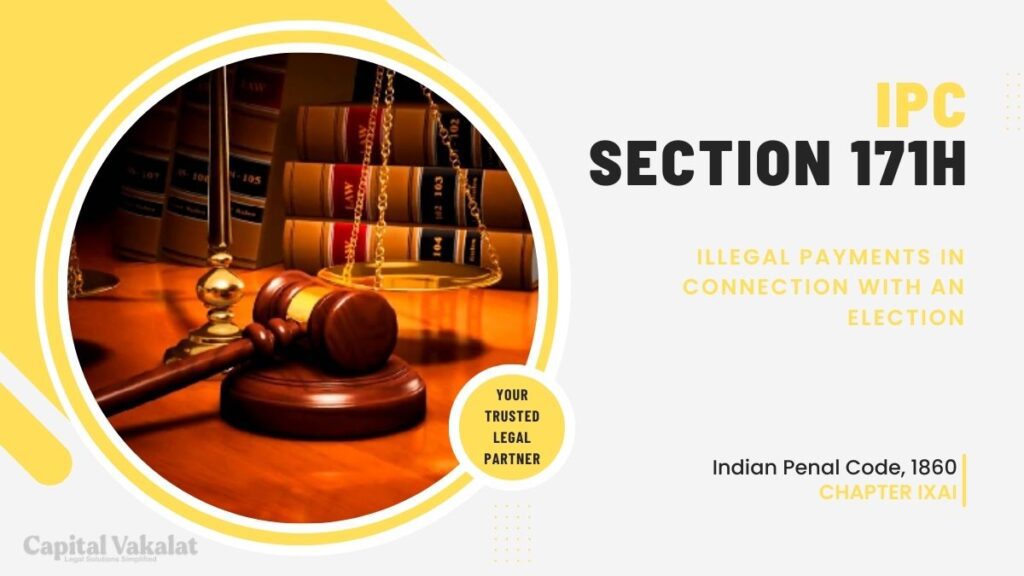In the grand tapestry of a democratic nation, elections are the threads that weave the very essence of representation and governance. These elections should be free, fair, and transparent. However, in the pursuit of power, individuals or groups may resort to illegal means to influence the outcome.

One such legal provision that seeks to maintain the sanctity of elections is Section 171H of the Indian Penal Code.
Understanding Section 171H IPC
Section 171H IPC, an essential component of Indian election law, was enacted with the purpose of preventing illegal payments and gratifications in connection with elections. This legal provision serves as a vital safeguard against corrupt practices that could taint the electoral process.
The Prohibition of Illegal Payments
Section 171H strictly prohibits any person from accepting or attempting to induce the acceptance of any illegal payment, gratification, or reward concerning an election. This covers a broad spectrum of activities, from bribing voters to funding candidates illegally. The scope of this law encompasses various scenarios in which electoral fraud could occur.
Legal Consequences
Violation of Section 171H IPC carries severe legal consequences. Those found guilty can face imprisonment, fines, or both, depending on the gravity of the offense. This stringent punishment serves as a deterrent, discouraging individuals from indulging in corrupt practices during elections.
The Need for Strict Enforcement
To maintain the integrity of the electoral process, strict enforcement of Section 171H is imperative. This not only safeguards the fundamental principles of democracy but also ensures that the voice of the people is not drowned out by illicit means.
Real-Life Examples
The impact of illegal payments on elections has been observed in real-life cases. These instances serve as a stark reminder of the potential consequences of electoral fraud on democracy itself.
In one case, candidates were caught distributing money to voters in an attempt to influence the election’s outcome. The culprits were subsequently prosecuted, highlighting the importance of Section 171H.
Prevention and Reporting
Preventing illegal payments requires collective efforts. Citizens must be vigilant and report any suspicious activities related to elections to the relevant authorities. Various mechanisms are in place to facilitate such reporting, ensuring that justice is served.
Political Parties and Accountability
Political parties play a pivotal role in upholding Section 171H. It is essential for political entities to maintain transparency and accountability in their financial dealings during elections, adhering to the law’s principles.
Public Awareness
Public awareness is crucial in the fight against electoral fraud. Citizens should be educated about the implications of illegal payments in elections, fostering a sense of responsibility to report any wrongdoing.
Challenges in Implementation
Despite the legal framework in place, challenges exist in the effective implementation of Section 171H. Overcoming these hurdles requires innovative solutions and robust mechanisms.
International Perspective
Comparing Section 171H with similar laws in other countries reveals valuable insights into the fight against electoral fraud. International experiences can offer lessons for India’s ongoing efforts.
Election Commission’s Role
The Election Commission plays a significant role in ensuring that elections are conducted fairly and transparently. Their efforts in upholding Section 171H are commendable.
Amendments and Reforms
Periodic reviews and potential amendments to strengthen Section 171H should be considered. This will help address emerging challenges and keep the law relevant.
Conclusion
In conclusion, Section 171H IPC serves as a critical pillar of India’s election laws. It stands as a robust guardian against illegal payments and gratifications in connection with elections, upholding the core principles of democracy.
Frequently Asked Questions
Can individuals report violations anonymously?
Yes, reporting mechanisms often allow individuals to report violations anonymously to protect their identity.
How do illegal payments impact the democratic process?
Illegal payments can distort the democratic process by influencing voter choices and undermining the fairness of elections.
Are there any exemptions under Section 171H?
Section 171H does not typically provide exemptions, as it aims to maintain the purity of the electoral process.
What is the public’s role in combating electoral fraud?
The public’s role is crucial in reporting any suspicious activities related to elections, contributing to fair and transparent electoral processes.